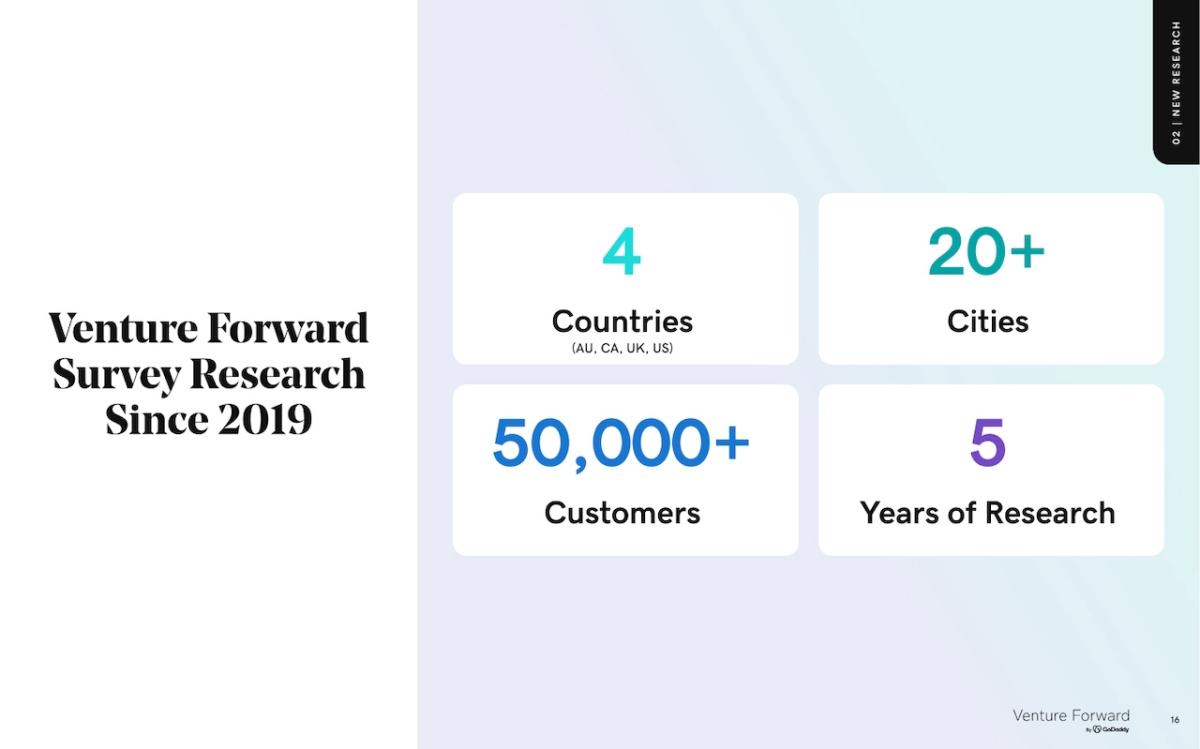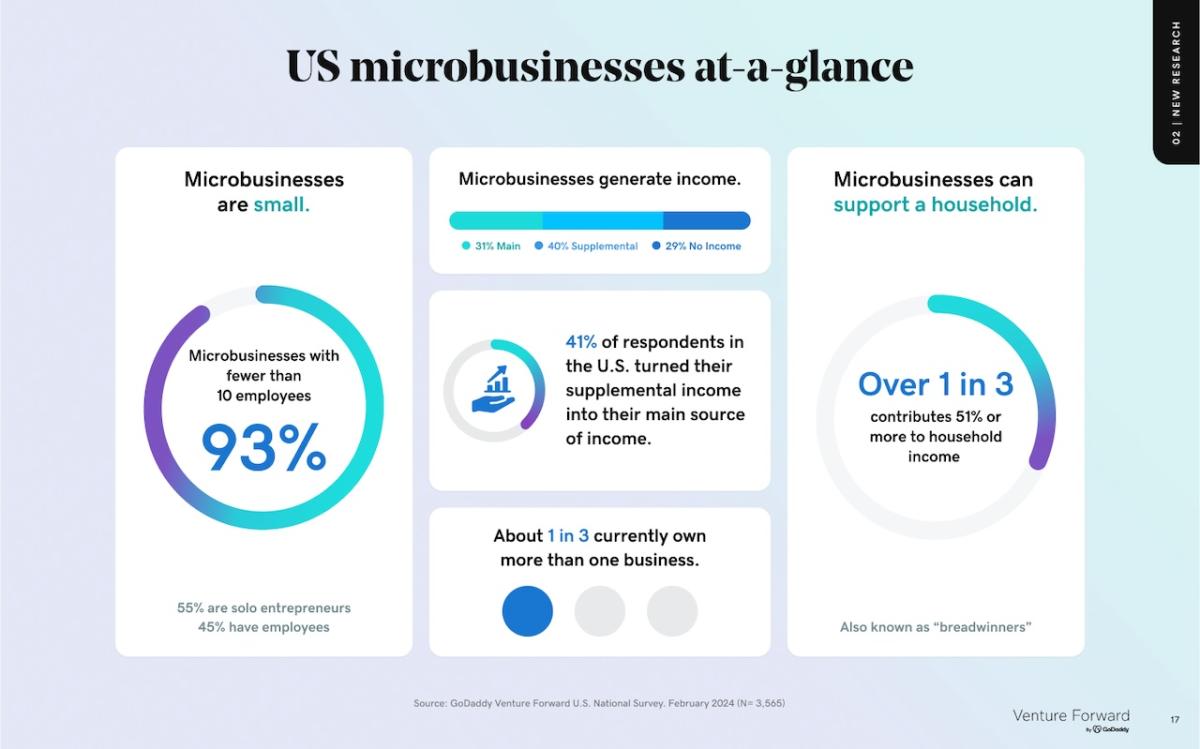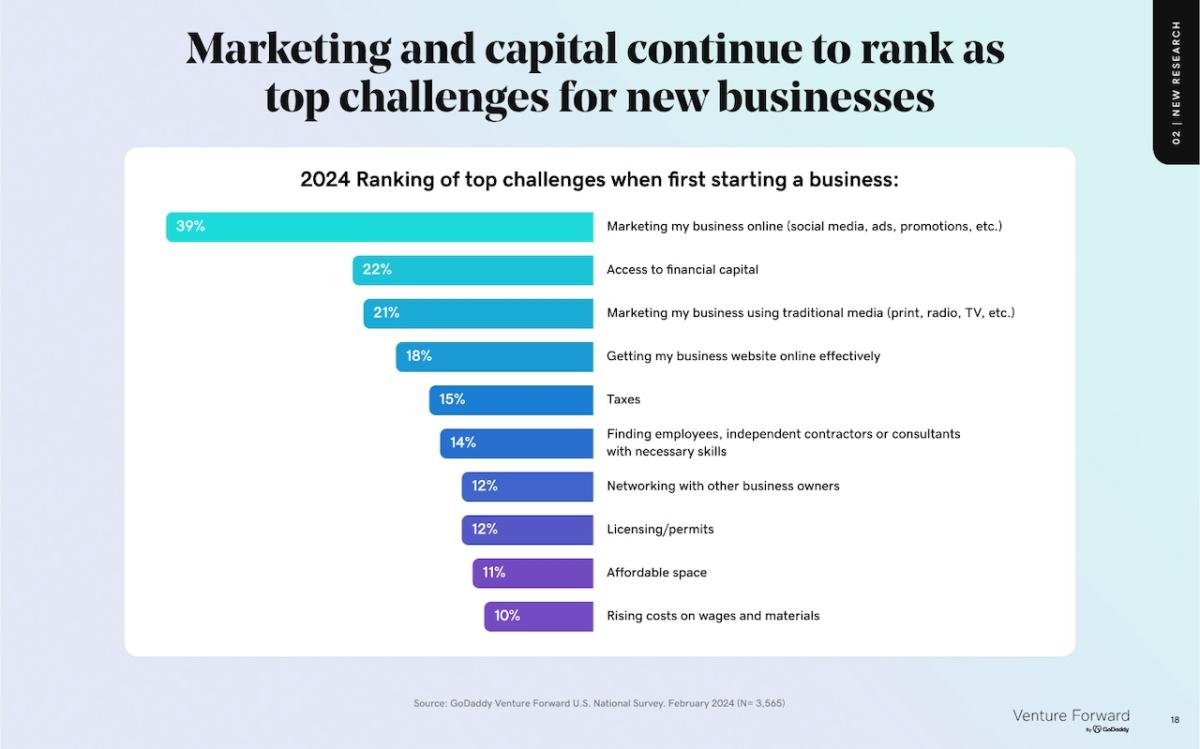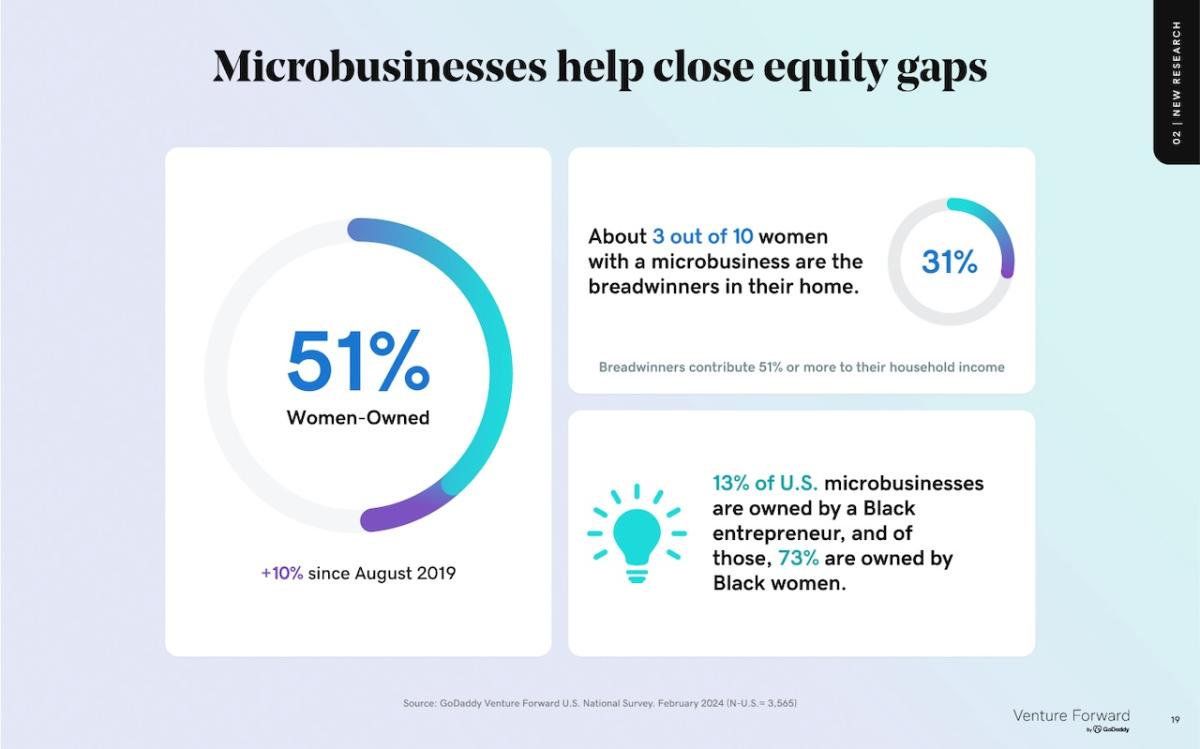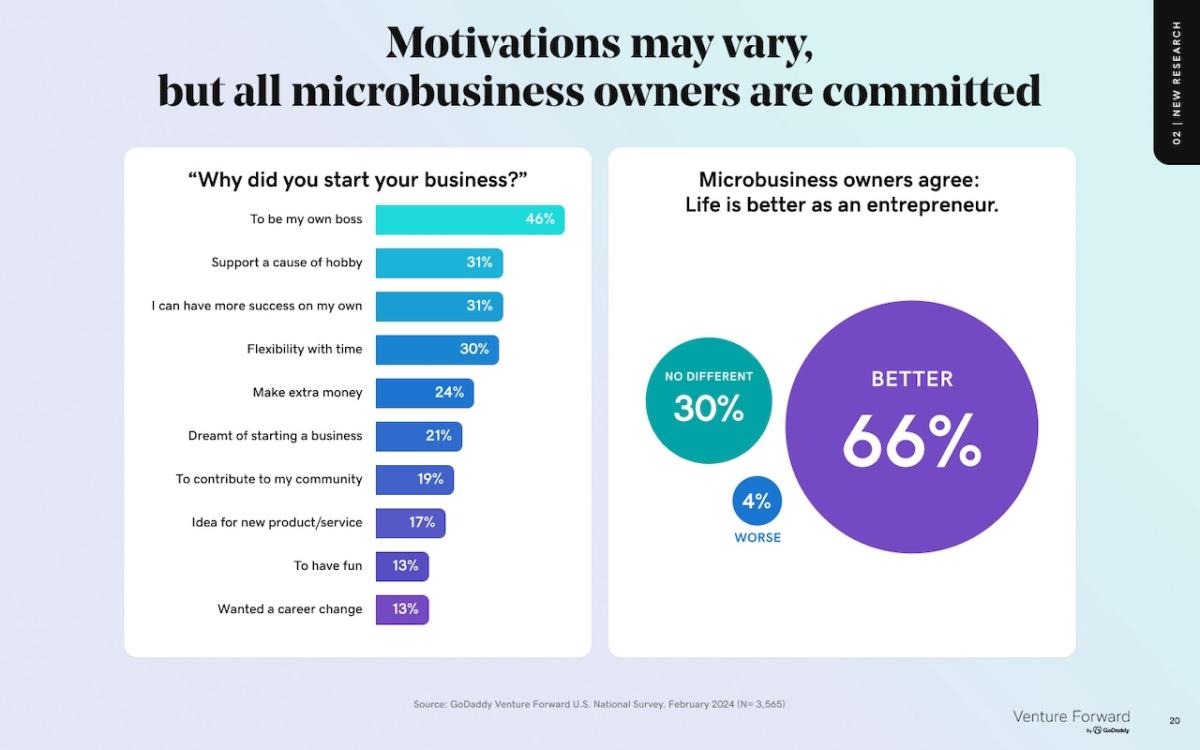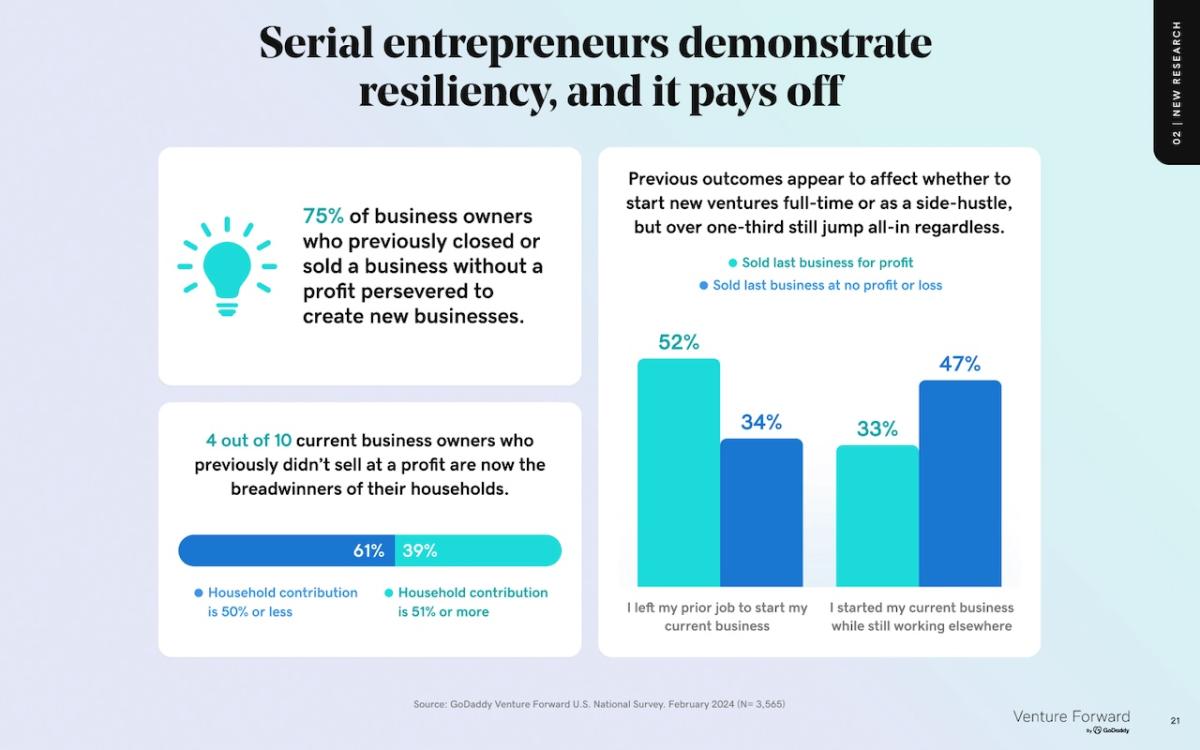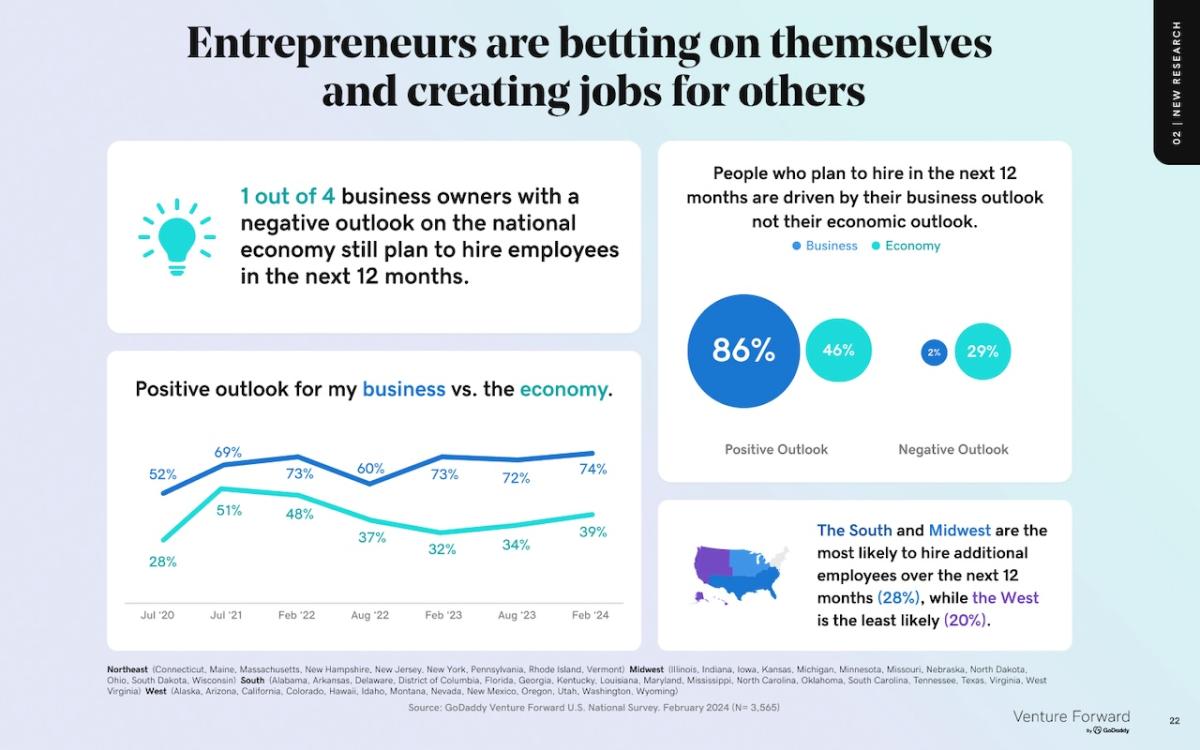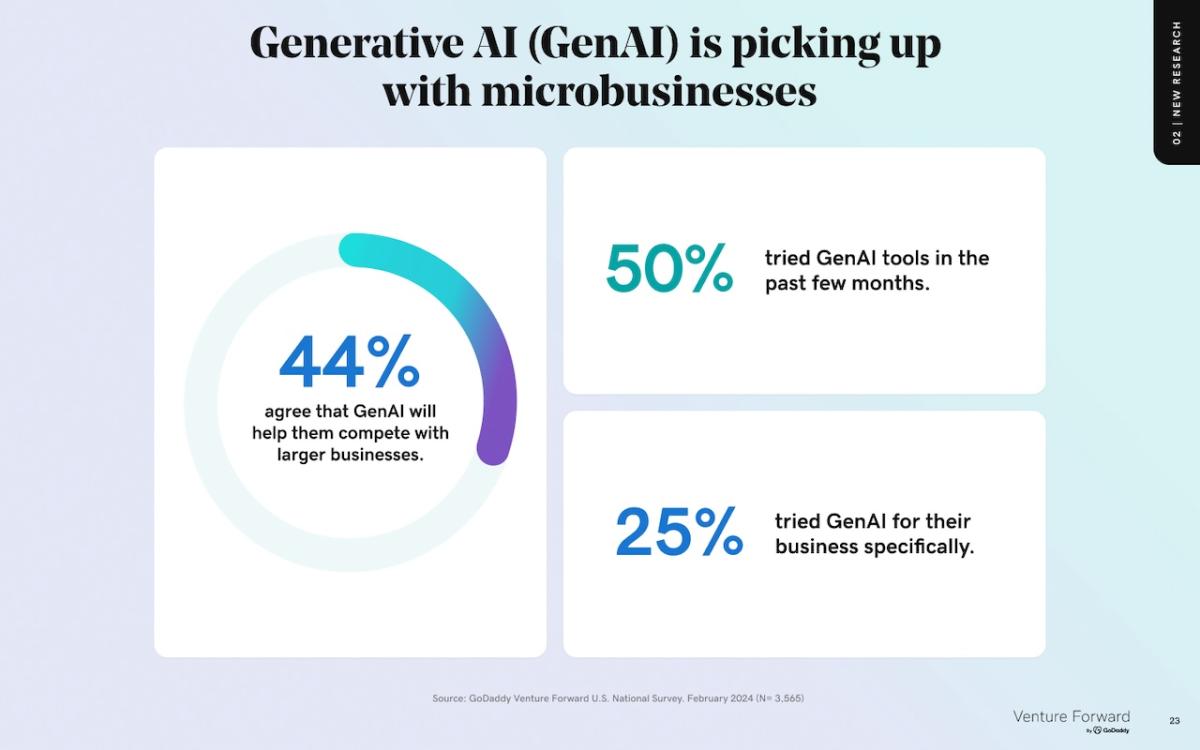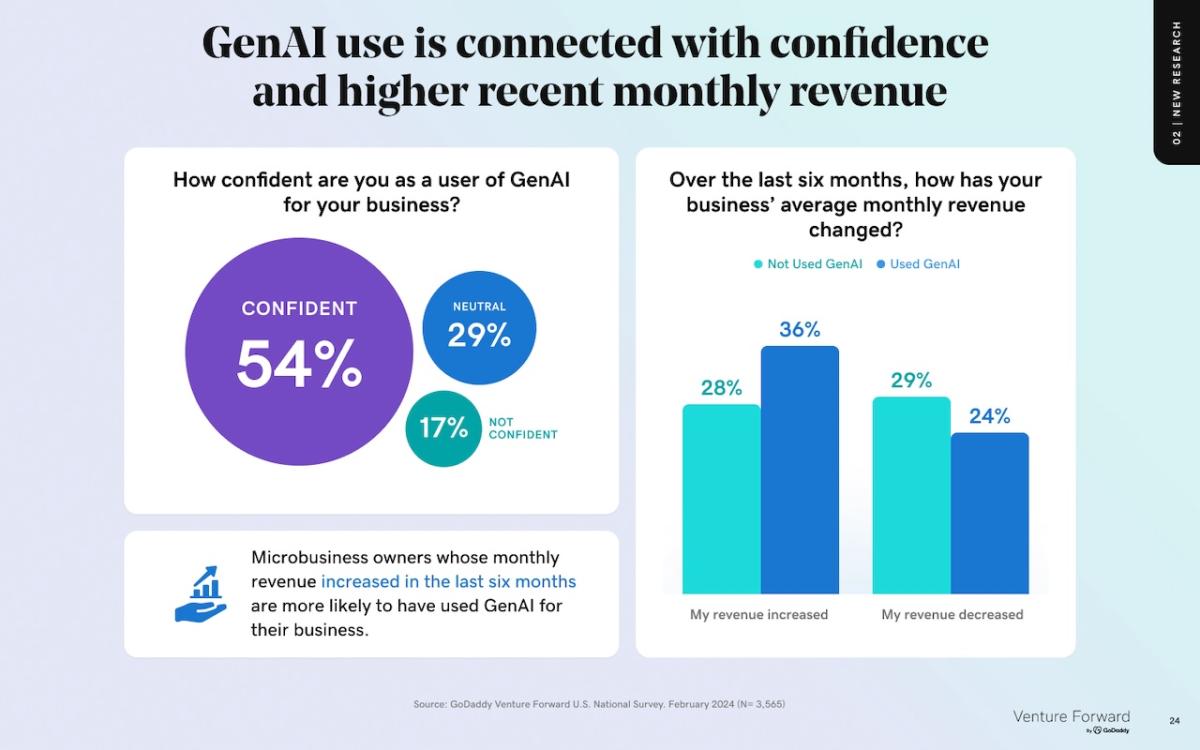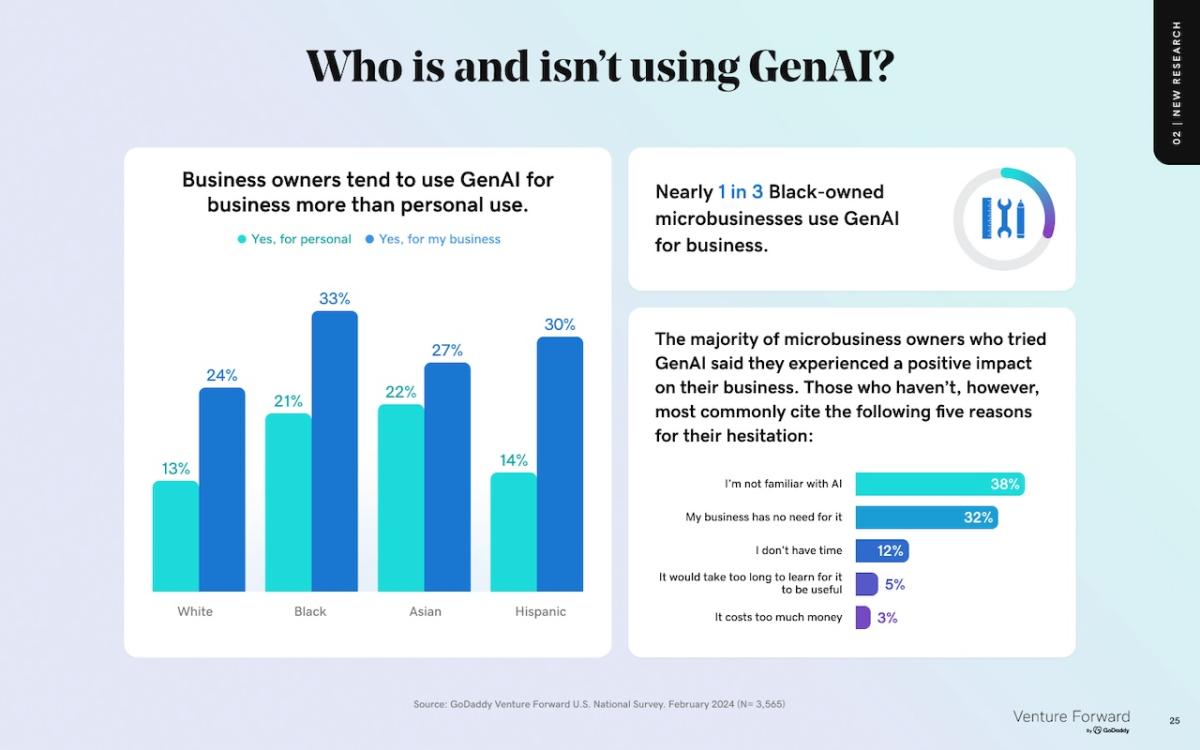GoDaddy Venture Forward 2024 Annual Report | U.S. Edition: 2024 National Microbusiness Survey Results
From serial entrepreneurship and resiliency to Gen Al use and closing equity gaps, microbusiness owners tell us who they are and what they care about.
As originally published by GoDaddy’s Venture Forward research initiative
Venture Forward Survey Research Since 2019
- 4 Countries (AU, CA, UK, US)
- 50,000+ Customers
- 20+ Cities
- 5 Years of Research
US microbusinesses at-a-glance1
Microbusinesses are small: 93% of microbusinesses have fewer than 10 employees
- 55% are solo entrepreneurs
- 45% have employees
Microbusinesses generate income.
- 31%: Main
- 40%: Supplemental
- 29%: No Income
41% of respondents in the U.S. turned their supplemental income into their main source of income.
About 1 in 3 currently own more than one business.
Microbusinesses can support a household.
Also known as "breadwinners"
- Over 1 in 3 contributes 51% or more to household income
Marketing and capital continue to rank as top challenges for new businesses1
Ranking of top challenges when first starting a business:
- 39%: Marketing my business online (social media, ads, promotions, etc.
- 22%: Access to financial capital
- 21%: Marketing my business using traditional media (print, radio, TV, etc.)
- 18%: Getting my business website online effectively
- 15%: Taxes
- 14%: Finding employees, independent contractors or consultants with necessary skills
- 12%: Networking with other business owners
- 12%: Licensing/permits
- 11%:Affordable space
- 10%: Rising costs on wages and materials
Microbusinesses help close equity gaps1
51% Women-Owned
- +10% since August 2019
31%: About 3 out of 10 women with a microbusiness are the breadwinners in their home.
- Breadwinners contribute 51% or more to their household income
13% of U.S. microbusinesses are owned by a Black entrepreneur, and of those, 73% are owned by Black women.
Motivations may vary, but all microbusiness owners are committed1
"Why did you start your business?"
- 46%: To be my own boss
- 31%: Support a cause of hobby
- 31%: I can have more success on my own
- 30%: Flexibility with time
- 24%: Make extra money
- 21%: Dreamt of starting a business
- 19%: To contribute to my community
- 17%: Idea for new product/service
- 13%: To have fun
- 13%: Wanted a career change
Microbusiness owners agree: Life is better as an entrepreneur.
- 66%: Better
- 30%: No Different
- 4%: Worse
Serial entrepreneurs demonstrate resiliency, and it pays off1
75% of business owners who previously closed or sold a business without a profit persevered to create new businesses.
4 out of 10 current business owners who previously didn't sell at a profit are now the breadwinners of their households.
- 61%: Household contribution is 50% or less
- 39%: Household contribution is 51% or more
Previous outcomes appear to affect whether to start new ventures full-time or as a side-hustle, but over one-third still jump all-in regardless.
I left my prior job to start my current business
- 52%: Sold last business for profit
- 34%: Sold last business at no profit or loss
I started my current business while still working elsewhere
- 33%: Sold last business for profit
- 47%: Sold last business at no profit or loss
Entrepreneurs are betting on themselves and creating jobs for others1
1 out of 4 business owners with a negative outlook on the national economy still plan to hire employees in the next 12 months.
Positive outlook for my business vs. the economy
| Jul'20 | Jul'21 | Feb'22 | Aug'22 | Feb'23 | Aug'23 | Feb'24 | |
| Business | 52% | 69% | 73% | 60% | 73% | 72% | 74% |
| Economy | 28% | 51% | 48% | 37% | 32% | 34% | 39% |
People who plan to hire in the next 12 months are driven by their business outlook not their economic outlook.
Positive Outlook
- 86%: Business
- 46%: Economy
Negative Outlook
- 2%: Business
- 29%: Economy
The South and Midwest are the most likely to hire additional employees over the next 12 months (28%), while the West is the least likely (20%).
- Northeast: (Connecticut, Maine, Massachusetts, New Hampshire, New Jersey, New York, Pennsylvania, Rhode Island, Vermont)
- Midwest (Illinois, Indiana, lowa, Kansas, Michigan, Minnesota, Missouri, Nebraska, North Dakota Ohio, South Dakota, Wisconsin) South (Alabama, Arkansas, Delaware, District of Columbia, Florida, Georgia, Kentucky, Louisiana, Maryland, Mississippi, North Carolina, Oklahoma, South Carolina, Tennessee, Texas, Virginia, West Virginia)
- West (Alaska, Arizona, California, Colorado, Hawaii, Idaho, Montana, Nevada, New Mexico, Oregon, Utah, Washington, Wyoming)
Generative Al (GenAI) is picking up with microbusinesses1
- 44% agree that GenAl will help them compete with larger businesses.
- 50% tried GenAl tools in the past few months.
- 25% tried GenAl for their business specifically.
GenAI use is connected with confidence and higher recent monthly1 revenue
- 54%: Confident
- 29%: Neutral
- 17%: Not Confident
Microbusiness owners whose monthly revenue increased in the last six months are more likely to have used GenAl for their business.
Over the last six months, how has your business' average monthly revenue changed?
My revenue increased
- 28%: Not used GenAI
- 36%: Used GenAI
My revenue decreased
- 29%: Not used GenAI
- 24%: Used GenAI
Who is and isn't using GenAl?1
Business owners tend to use GenAl for business more than personal use.
White
- 13%: Yes, for personal
- 24%: Yes, for my business
Black
- 21%: Yes, for personal
- 33%: Yes, for my business
Asian
- 22%: Yes, for personal
- 27%: Yes, for my business
Hispanic
- 14%: Yes, for personal
- 30%: Yes, for my business
Nearly 1 in 3 Black-owned microbusinesses use GenAl for business.
The majority of microbusiness owners who tried GenAl said they experienced a positive impact on their business. Those who haven't, however, most commonly cite the folowing five reasons for their hesitation:
- 38%: I'm not familiar with Al
- 32%: My business has no need for it
- 12%: I don't have time
- 5%: It would take too long to learn for it to be useful
- 3%: It costs too much money
GoDaddy Venture Forward 2024 Annual Report | U.S. Edition
This report is powered by the latest data from Venture Forward, GoDaddy's research initiative to quantify the presence and impact of over 20 million global online microbusinesses on their local economies, while shining a light on the entrepreneurs behind them.
We’re here to support entrepreneurs.
Contact GoDaddy Venture Forward at VentureForward@GoDaddy.com
1Source: GoDaddy Venture Forward U.S. National Survey. February 2024 (N=3,565)

